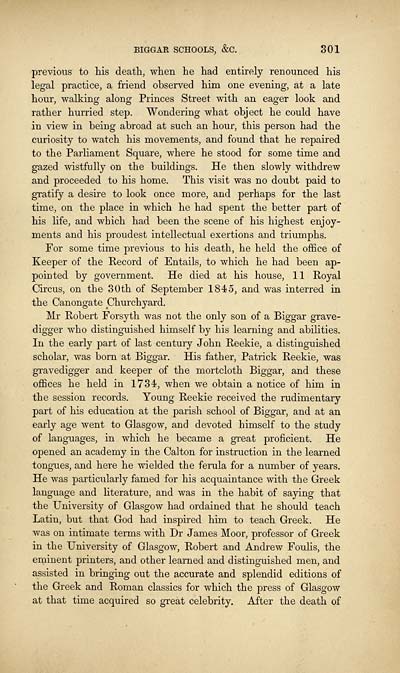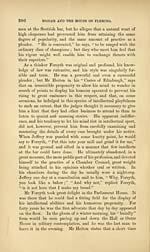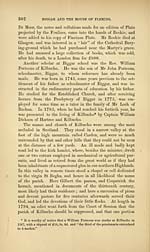Biggar and the House of Fleming
(331) Page 313
Download files
Complete book:
Individual page:
Thumbnail gallery: Grid view | List view

BIGGAR SCHOOLS, &C. 301
previous to his death, when he had entirely renounced his
legal practice, a friend observed him one evening, at a late
hour, walking along Princes Street with an eager look and
rather hurried step. Wondering what object he could have
in view in being abroad at such an hour, this person had the
curiosity to watch his movements, and found that he repaired
to the Parliament Square, where he stood for some time and
gazed wistfully on the buildings. He then slowly withdrew
and proceeded to his home. This visit was no doubt paid to
gratify a desire to look once more, and perhaps for the last
time, on the place in which he had spent the better part of
his life, and which had been the scene of his highest enjoy-
ments and his proudest intellectual exertions and triumphs.
For some time previous to his death, he held the office of
Keeper of the Record of Entails, to which he had been ap-
pointed by government. He died at his house, 11 Royal
Circus, on the 30th of September 1845, and was interred in
the Canongate Churchyard.
Mr Robert Forsyth was not the only son of a Biggar grave-
digger who distinguished himself by his learning and abilities.
In the early part of last century John Reekie, a distinguished
scholar, was born at Biggar. His father, Patrick Reekie, was
gravedigger and keeper of the mortcloth Biggar, and these
offices he held in 1734, when we obtain a notice of him in
the session records. Young Reekie received the rudimentary
part of his education at the parish school of Biggar, and at an
early age went to Glasgow, and devoted himself to the study
of languages, in which he became a great proficient. He
opened an academy in the Calton for instruction in the learned
tongues, and here he wielded the ferula for a number of years.
He was particularly famed for his acquaintance with the Greek
language and literature, and was in the habit of saying that
the University of Glasgow had ordained that he should teach
Latin, but that God had inspired him to teach Greek. He
was on intimate terms with Dr James Moor, professor of Greek
in the University of Glasgow, Robert and Andrew Foulis, the
eminent printers, and other learned and distinguished men, and
assisted in bringing out the accurate and splendid editions of
the Greek and Roman classics for which the press of Glasgow
at that time acquired so great celebrity. After the death of
previous to his death, when he had entirely renounced his
legal practice, a friend observed him one evening, at a late
hour, walking along Princes Street with an eager look and
rather hurried step. Wondering what object he could have
in view in being abroad at such an hour, this person had the
curiosity to watch his movements, and found that he repaired
to the Parliament Square, where he stood for some time and
gazed wistfully on the buildings. He then slowly withdrew
and proceeded to his home. This visit was no doubt paid to
gratify a desire to look once more, and perhaps for the last
time, on the place in which he had spent the better part of
his life, and which had been the scene of his highest enjoy-
ments and his proudest intellectual exertions and triumphs.
For some time previous to his death, he held the office of
Keeper of the Record of Entails, to which he had been ap-
pointed by government. He died at his house, 11 Royal
Circus, on the 30th of September 1845, and was interred in
the Canongate Churchyard.
Mr Robert Forsyth was not the only son of a Biggar grave-
digger who distinguished himself by his learning and abilities.
In the early part of last century John Reekie, a distinguished
scholar, was born at Biggar. His father, Patrick Reekie, was
gravedigger and keeper of the mortcloth Biggar, and these
offices he held in 1734, when we obtain a notice of him in
the session records. Young Reekie received the rudimentary
part of his education at the parish school of Biggar, and at an
early age went to Glasgow, and devoted himself to the study
of languages, in which he became a great proficient. He
opened an academy in the Calton for instruction in the learned
tongues, and here he wielded the ferula for a number of years.
He was particularly famed for his acquaintance with the Greek
language and literature, and was in the habit of saying that
the University of Glasgow had ordained that he should teach
Latin, but that God had inspired him to teach Greek. He
was on intimate terms with Dr James Moor, professor of Greek
in the University of Glasgow, Robert and Andrew Foulis, the
eminent printers, and other learned and distinguished men, and
assisted in bringing out the accurate and splendid editions of
the Greek and Roman classics for which the press of Glasgow
at that time acquired so great celebrity. After the death of
Set display mode to:
![]() Universal Viewer |
Universal Viewer | ![]() Mirador |
Large image | Transcription
Mirador |
Large image | Transcription
Images and transcriptions on this page, including medium image downloads, may be used under the Creative Commons Attribution 4.0 International Licence unless otherwise stated. ![]()
| Histories of Scottish families > Biggar and the House of Fleming > (331) Page 313 |
|---|
| Permanent URL | https://digital.nls.uk/94843254 |
|---|
| Description | A selection of almost 400 printed items relating to the history of Scottish families, mostly dating from the 19th and early 20th centuries. Includes memoirs, genealogies and clan histories, with a few produced by emigrant families. The earliest family history goes back to AD 916. |
|---|

